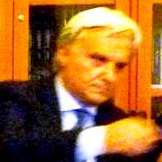This Cavalleria rusticana is a revival of a 2012 Pippo Delbono’s production is performed within the Teatro San Carlo’s summer season. Cavalleria is one of the few titles in the opera repertoire that attract crowds all over the world, regardless of the cast of singers, due to its expressivity, melodiousness and symphonic complexity. The opera debuted in 1890 and is considered the first example of Italian verismo, containing intense emotion, extreme passions and some outstanding music.
Sergio Tramonti's set shows a space surrounded by high wooden walls with doors. Thus, the only scene is a gloomy reddish room in which the story unfolds until the appalling final cry "Compare Turiddu has been killed!”.
Director Pippo Delbono again imposed his presence on stage and stalls, first telling the public (showered with red petals) two doleful episodes about his private life, then interfering with the opera by hopping on stage, passing through the singers and opening the doors to let the light in. Notwithstanding Delbono’s narcissistic excesses, the staging confirmed itself as effective and penetrating, in which any realism was abandoned in favour of an introspective analysis of the drama, a further step in the director’s idea of theatre as a personal, never-ending grieving process, one could say.
A performance of deadly violence, indeed, but also of sound piety, which permeates the score and the action, with church bells sounding for the Mass which Santuzza cannot attend because of her immorality. The stage movements of the singers and the chorus were as little as possible, in order to highlight the solemn, almost hieratic and timeless atmosphere in which the plot is immersed.
The most appreciated and applauded of all the cast was mezzo-soprano Violeta Urmana (Santuzza). With her vocal extension, her round tone with a burnished colour, without sentimental excess, she created the image of a passionate young woman, her feelings hurt by an unfaithful Turiddu. Urmana sang with a heartfelt and flexible voice, with a warm vibrato in high notes, and created a compassionate character. Even when singing with strong emotion and declamation, her tone never lost its beauty. Her violent duet with her lover Turiddu, who had seduced and abandoned her, was one of the highlights of the opera. Other highlights included the Easter Chorus and the prelude and intermezzo played by the orchestra.
Elena Zilio as Mamma Lucia, made the most of her short role, using her sound mezzo-soprano sympathetically with an intense singing line and a grief-stricken stage presence, as the character requires. Marcelo Álvarez played an exemplary Turiddu, the young man who abandons Santuzza in pursuit of Lola, with a full and strong tenor and a powerful and expressive sound. He ends up being killed in a duel by Alfio, sung by George Gagnidze, whose passionate and impetuous baritone has a considerable extension. Leyla Martinucci in the role of Lola, the seductress, proved effective with her warm voice, sensual timbre and impertinent acting.
Juraj Valčuha conducted in a balanced and intelligent way, drawing precision, colour and dynamism from an inspired San Carlo Orchestra; the Chorus of the San Carlo Theatre, directed by Gea Garatti Ansini, sang well.




